Akşehir
Akşehir is a municipality and district of Konya Province, Turkey.[2] Its area is 895 km2,[3] and its population is 93,965 (2022).[1] It was known historically as Philomelium.[4]
Akşehir | |
|---|---|
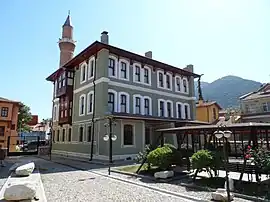 Akşehir Ethnography Museum | |
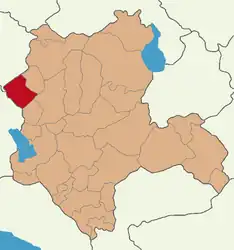 Map showing Akşehir District in Konya Province | |
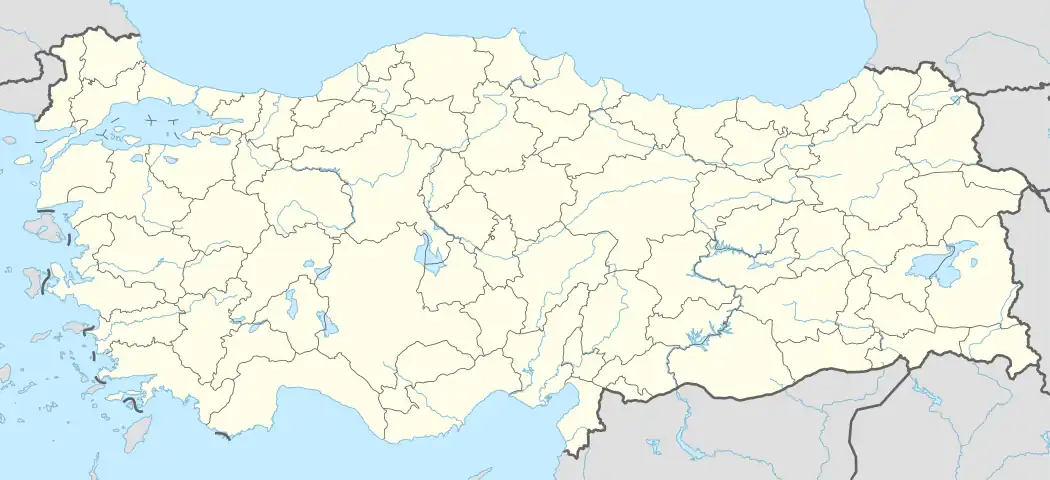 Akşehir Location in Turkey 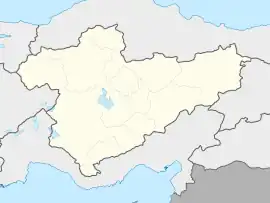 Akşehir Akşehir (Turkey Central Anatolia) | |
| Coordinates: 38°21′27″N 31°24′59″E | |
| Country | Turkey |
| Province | Konya |
| Government | |
| • Mayor | Salih Akkaya (AKP) |
| Area | 895 km2 (346 sq mi) |
| Elevation | 1,025 m (3,363 ft) |
| Population (2022)[1] | 93,965 |
| • Density | 100/km2 (270/sq mi) |
| Time zone | TRT (UTC+3) |
| Area code | 0332 |
| Climate | Csb |
| Website | www |
The town is situated at the edge of a fertile plain, on the north side of the Sultan Mountains.[5] Its elevation is 1,025 m (3,363 ft).[6]

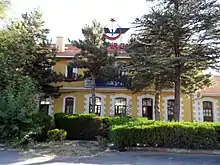
History
Philomelion (Φιλομήλιον) was probably a Pergamene foundation on the great Graeco-Roman Highway from Ephesus to the east and Cicero, on his way to Cilicia, dated some of his extant correspondence there. St Paul passed the city on his second and third missionary journey in the first century and his impact can be traced by numerous Christian inscriptions in the region.[7] The Smyrniotes wrote the letter that describes the martyrdom of Polycarp to the townspeople of Philomelion. The town became at some point a bishopric and remains a titular see of the Catholic Church.[8]
At some point after 1071, the city fell to the Seljuk Sultanate of Rum. It was retaken by forces of the First Crusade and in 1098 Stephen of Blois met emperor Alexios I Komnenos here, persuading him to not continue his march to Antioch.[9] Alexios returned in one of his final campaigns in 1116 to Philomelion which he conquered and returned with many Greek refugees to Byzantine lands.[4] In 1146, the town was taken by emperor Manuel I Komnenos after defeating forces of the Sultanate of Rum at Akroinon. Manuel burned the town and released several prisoners who had been detained here. The town was taken a final time by German members of the Third Crusade in 1190 but rebuild in 1196 by Kaykhusraw I and resettled with Greek captives taken on a raid from Caria.[4]
It became an important Seljuk town, and late in the 14th century passed into Ottoman hands. There Sultan Bayezid I is said by Ali of Yezd to have died after his defeat at the Battle of Ankara at the hands of Emir Timur.[5]
The town's landmarks include the alleged tomb of Nasreddin Hoca, the tomb of Seydi Mahmut, the house used as headquarters by the Turkish Army during the last phase of the Greco-Turkish War (1919–1922), other monuments and old Turkish houses.
Between 5 July and 10 July each year, commemorations with concerts and other social activities are held to the memory of Akşehir's famous resident, Nasreddin Hodja.
With its rich architectural heritage, Akşehir is a member of the Norwich-based European Association of Historic Towns and Regions.[10]
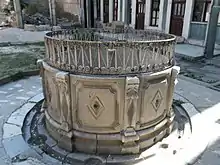
Name
The Turkish name Akşehir literally means "white city". It is a compound of two words, namely ak, "white", a Turkic word; and şehir, "town", which is from Persian شهر shahr, "town".
In English usage other spellings of the name include Ak-Shehr, Ak-Shahr, Akshehr, Akshahr, Akshehir, and Aqshahr.
Composition
There are 55 neighbourhoods in Akşehir District:[11]
- Adsız
- Ahicelal
- Alanyurt
- Altunkalem
- Altuntaş
- Anıt
- Atakent
- Bozlağan
- Çakıllar
- Çamlı
- Cankurtaran
- Çay
- Çimendere
- Çimenli
- Değirmenköy
- Doğrugöz
- Engilli
- Eskikale
- Gazi
- Gedil
- Gölçayır
- Gözpınarı
- Ilıcak
- İstasyon
- Karabulut
- Karahüyük
- Kileci
- Kızılca
- Kozağaç
- Kuruçay
- Kuşcu
- Meydan
- Nasreddin Hoca
- Ortaca
- Ortaköy
- Reis
- Sarayköy
- Savaş
- Selçuk
- Seyran
- Söğütlü
- Sorkun
- Tekkeköy
- Tipi
- Tipiköy
- Üçhüyük
- Ulupınar
- Yarenler
- Yaşarlar
- Yaylabelen
- Yazla
- Yeni
- Yeniköy
- Yeşilköy
- Yıldırım Bayezid
Climate
| Climate data for Aksehir | |||||||||||||
|---|---|---|---|---|---|---|---|---|---|---|---|---|---|
| Month | Jan | Feb | Mar | Apr | May | Jun | Jul | Aug | Sep | Oct | Nov | Dec | Year |
| Average high °C (°F) | 5 (41) |
7 (44) |
11 (51) |
16 (60) |
21 (69) |
25 (77) |
28 (82) |
28 (82) |
25 (77) |
18 (64) |
13 (55) |
7 (44) |
17 (62) |
| Average low °C (°F) | −2 (28) |
−1 (30) |
1 (33) |
5 (41) |
9 (48) |
12 (53) |
14 (57) |
14 (57) |
10 (50) |
6 (42) |
2 (35) |
0 (32) |
5 (41) |
| Average precipitation mm (inches) | 71 (2.8) |
66 (2.6) |
69 (2.7) |
69 (2.7) |
56 (2.2) |
46 (1.8) |
18 (0.7) |
13 (0.5) |
18 (0.7) |
48 (1.9) |
56 (2.2) |
76 (3) |
610 (23.9) |
| Source: Weatherbase [12] | |||||||||||||
References
- "Address-based population registration system (ADNKS) results dated 31 December 2022, Favorite Reports" (XLS). TÜİK. Retrieved 19 September 2023.
- Büyükşehir İlçe Belediyesi, Turkey Civil Administration Departments Inventory. Retrieved 19 September 2023.
- "İl ve İlçe Yüz ölçümleri". General Directorate of Mapping. Retrieved 19 September 2023.
- Hendy, Michael F. (October 2008). Studies in the Byzantine Monetary Economy C.300-1450. Cambridge University Press. pp. 123–126. ISBN 9780521088527. Retrieved 9 October 2023.
- One or more of the preceding sentences incorporates text from a publication now in the public domain: Chisholm, Hugh, ed. (1911). "Ak-Shehr". Encyclopædia Britannica. Vol. 1 (11th ed.). Cambridge University Press. p. 458.
- Falling Rain Genomics, Inc. "Geographical information on Akşehir, Turkey". Retrieved 25 September 2023.
- Breytenbach, Cilliers; Zimmermann, Christiane (December 2017). Early Christianity in Lycaonia and Adjacent Areas From Paul to Amphilochius of Iconium. Brill. p. 241. ISBN 9789004352520. Retrieved 9 October 2023.
- "Titular Episcopal See of Philomelium". GCatholic.org. GCatholic.org. Retrieved 9 October 2023.
- France, John (1994). Victory in the East A Military History of the First Crusade. Cambridge University Press. p. 299. ISBN 9780521589871. Retrieved 9 October 2023.
- The European Association of Historic Towns and Regions. "Historic Towns of Turkey". Archived from the original (DOC) on 2009-09-17. Retrieved 2008-03-22.
- Mahalle, Turkey Civil Administration Departments Inventory. Retrieved 19 September 2023.
- "Weatherbase: Historical Weather for Aksehir, Turkey". Weatherbase. 2011. Retrieved on November 24, 2011.
- Attribution
 This article incorporates text from a publication now in the public domain: Herbermann, Charles, ed. (1913). "Philomelium". Catholic Encyclopedia. New York: Robert Appleton Company.
This article incorporates text from a publication now in the public domain: Herbermann, Charles, ed. (1913). "Philomelium". Catholic Encyclopedia. New York: Robert Appleton Company.
External links
- District governor's official website (in Turkish)
- District municipality's official website (in Turkish)
